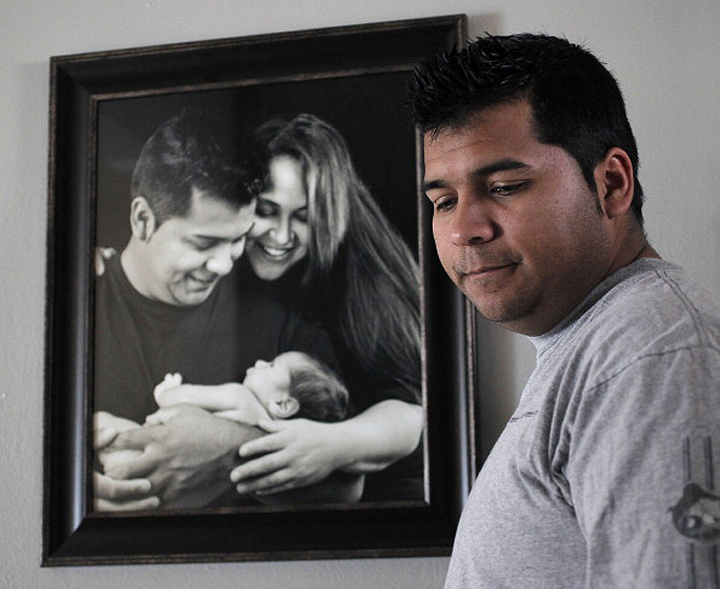Editor’s note: This story was originally published on Jan. 10, 2014.

TORONTO – The pregnant, brain-dead Texas woman being kept on life support over her family’s protests is carrying a fetus that is “distinctly abnormal,” attorneys for the woman’s husband said Wednesday.
READ MORE: Brain-dead pregnant woman being kept on life support has fetus with severe defects
On Nov. 26, Marlise Machado Muñoz, 33, was discovered unconscious by her husband in their home after she collapsed from what doctors believe was a blood clot in her lungs.
Against her family’s wishes, Muñoz was put on ventilator after doctors learned she was 14 weeks pregnant.
Last week, Erik Muñoz filed a lawsuit against the hospital asking a judge to order John Peter Smith Hospital to remove life support for his wife.
He said he and his wife are both paramedics and are familiar with end-of-life issues.
READ MORE: Husband of pregnant, brain-dead Texas woman sues hospital
First passed by legislature in 1989 and amended in 1999, Texas law states that a person may not withdraw or withhold “life-sustaining treatment” from a pregnant patient.
According to 2012 report from the Center for Women Policy Studies in Washington, at least 31 states “have adopted laws restricting the ability of doctors to end life support for terminally ill pregnant women, regardless of the wishes of the patient or the family.”
Despite her “living will” and against the wishes of her husband Erick and her family, Munoz’s body continues to be been maintained by mechanical support.
“She did not want to be on life support,” her mother, Lynne Machado, told CBS News. “We knew what her wishes were as well as her husband’s, so we were all on the same page.”
Munoz and her husband have a 15-month-0ld child.
A spokesperson for the hospital where Munoz is being treated said they could not release specific details regarding Munzo’s case, but they released the following statement:
“We can’t withdraw treatment from a pregnant person as the law states. Every day, we have patients and families who must make difficult decisions. Our position remains the same. We follow the law.”
Munoz’s attorneys, Heather King and Jessica Hall Janicek, issued a statement Wednesday describing the condition of the fetus, now believed to be at about 22 weeks’ gestation. King and Janicek based their statement on medical records they received from the hospital.
“According to the medical records we have been provided, the fetus is distinctly abnormal,” the attorneys said. “Even at this early stage, the lower extremities are deformed to the extent that the gender cannot be determined.”
The attorneys said the fetus also has fluid building up inside the skull and possibly has a heart problem.
- B.C. to ban drug use in all public places in major overhaul of decriminalization
- 3 women diagnosed with HIV after ‘vampire facials’ at unlicensed U.S. spa
- Solar eclipse eye damage: More than 160 cases reported in Ontario, Quebec
- ‘Super lice’ are becoming more resistant to chemical shampoos. What to use instead
A hearing in the case is scheduled for Friday.
The debate: When is dead not dead?
The case of Munoz continues to make headlines as legal and ethical question whether the law applies to pregnant patients who are brain-dead as opposed to those in a come or a vegetative state.
Patients who are declared brain dead are no longer alive as there is an irreversible loss of all functions of the brain. Those who are in a in vegetative states are alive but are believed to have complete absence of awareness of the self and the environment.
Munoz’s father, Ernest Machado, told The New York Times that his daughter is a “host for the fetus.”
“I get angry with the state,” he said. “What business did they have delving into these areas? Why are they practicing medicine up in Austin?”
The Center for Women Policy Studies said the law is a way for “terminally ill women” to be forced to “exist as human incubators.”
Critics say “brain death” can be readily determined. Such a determination, they say, is “legally death, even if other bodily functions can be maintained.”
“If she is dead, I don’t see how she can be a patient, and I don’t see how we can be talking about treatment options for her,” said Thomas W. Mayo, an expert on health care law and bioethics at Dallas’ Southern Methodist University law school in an interview with The New York Times.
Joe Pojman, founder of Texas Alliance for Life, said he commends the hospital doing “everything it can to continue to protect the life of that child.”
“There is an unborn child who is alive and deserves protection,” he said. “We would hope the state of Texas would always do everything in its power to keep children alive.”
READ MORE: Calif. teen called ‘brain dead’ gets feeding tube




Comments